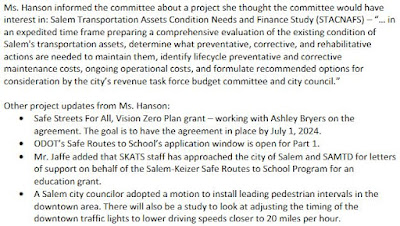The technical committee for our Metropolitan Planning Organization meets on Tuesday the 9th, and they should, but likely will not, face the incoherence in our dominant autoist paradigm.
 |
| Frames for less driving vs more driving |
Right now the policy conversations on greenhouse gas emissions and on congestion relief are disconnected. They each happen in a vacuum as if the other was not happening.
Our need to reduce emissions from driving means less driving and slower driving so that non-auto transportation is safer and more comfortable.
But our wish for congestion relief means faster driving and more driving from induced demand.
We need to connect the two discourses and make congestion relief secondary to greenhouse gas reduction and to safety.
 |
| How seriously will they take this? |
I am not sure at the moment that the technical details of picking a particular target measure are all that critical.
There's a good bit of false precision, hiding a real margin of error, in the target definitions, and it's hard to say that one definition is meaningfully better than the others. Staff capacity, and preference for easier measurements that piggyback on ODOT work, seems to be driving the decision, and this seems just fine. Maybe someone will raise a real objection, but the real value might be more in the project scoring and analysis, "how the projects and programs...are helping achieve the target." |
| Congestion "analysis": A baseline of speeding! And anti-safety |
On the congestion side, though it is buried a little and understated,
there is an ambiguous acknowledgment of the illegal nature of the "free flow"
baseline. If everybody is driving at the speed limit, that counts as
"congestion" and "delay." As we've noted before, streets functioning as intended are already defined as congested and defective, requiring intervention or relief.
Much of our congestion analysis is based on speeding and willfully
misunderstanding lawful compliance with speed limits! It's not just that TTI values under 1.0 represent exceeding posted speeds, it's that the baseline 1.0 itself implies exceeding posted speed. This is BS and
should be addressed.
Previously see:
In other matters, at last month's "roundtable" sharing, there were interesting bits from Cherriots and the City of Salem.
 |
| Bikey news at Cherriots |
From Cherriots:
- South Salem Transit Center: In preliminary phase; completed preliminary design and schematic design and have moved to the NEPA (National Environmental Policy Act) process – the goal is to complete NEPA in May. The next phase will be property acquisition with ongoing conversations for concurrence from FTA (Federal Transit Administration). Finalizing design and engineering is scheduled for March or April of 2025 with bidding and construction document preparation scheduled for completion in the summer of 2026. Funding has been secured for design activities and $500,000 is confirmed for construction. SAMTD will be applying for funding for facilities and the rest of the construction needs.
- Micromobility/ Bike Share Feasibility Study: Scope of work has been drafted with the focus of study to be within the UGB (Salem, Keizer, and some unincorporated areas [of Marion County].) The goal is to find the best means and methods for providing a bicycle share in the determined area. The study will look at infrastructure, and policy recommendations or resolutions needed to be in place to have a successful program. If the result of the feasibility study is to recommend going forward with the program, the next step would be implementation. The timeline is roughly for RFP release in May, issuing contracts in July, and study results first part of 2025.
- The bike map for Salem-Keizer is being updated, with the goal of a printed version this spring.
 |
| News from the City |
And from the City:
- Salem Transportation Assets Condition Needs and Finance Study (STACNAFS) – “... in an expedited time frame preparing a comprehensive evaluation of the existing condition of Salem's transportation assets, determine what preventative, corrective, and rehabilitative actions are needed to maintain them, identify lifecycle preventative and corrective maintenance costs, ongoing operational costs, and formulate recommended options for consideration by the city’s revenue task force budget committee and city council.”
- Safe Streets For All, Vision Zero Plan grant – working with Ashley Bryers on the agreement. The goal is to have the agreement in place by July 1, 2024.
The SKATS Technical Advisory Committee meets Tuesday the 9th at 1:30pm. The agenda and meeting packet can be downloaded at the calendar notice.


No comments:
Post a Comment